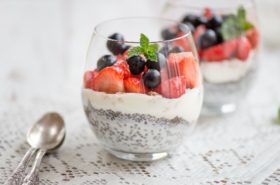Suffering from a bloated belly can be very uncomfortable and at times even painful. Often the reasons for your swollen belly are related to lifestyle and the food you eat. However, if your symptoms persist after following the simple tips below, you should seek nutritional advice from an accredited practising dietitian.
Avoid usual suspect foods: limit caffeinated drinks, soft drinks, Alcohol and spicy and fatty foods.

Drink more water ~
Limit or replace dairy~
If you feel bloated after consuming dairy you may suffer from lactose intolerance. Limit your dairy intake or use dairy free alternatives such as lactose free, soy, rice or almond milk.


Get moving~
for a walk or jog can help ease the bloating discomfort. Alternatively you can do some light yoga stretches such as twists and back bends.
Limit salt~
salt causes your body to retain fluid. Reduce or even eliminate products with high salt content such as some commercial foods, sauces, and salad dressings.



Increase fibre rich foods~
Fibre is an important addition to any diet. Fibre from fruits, vegetables, nuts and seeds and whole grains will assist in maintaining bowel health and manage constipation. Being constipated can be very bloating!
Drink lemon water and herbal teas~
Some studies support the use of drinking a big glass of warm water and herbal teas such as mint, ginger, and fennel teas can help to sooth your bloated tummy.


Stress less ~
Try taking time out to enjoy the simple pleasures in life like drinking a cup of herbal tea, reading a book, doing some light stretches.
Consider a low FODMAP diet ~
If your bloating symptoms persist, a low FODMAP diet may be an option. FODMAP is short for Fermentable Oligosaccharides Disaccharides (eg. Lactose) Monosaccharides (eg. excess Fructose) and Polyols (eg. Sorbitol, Mannitol, Maltitol, Xylitol and Isomalt). FODMAPS are a collection of molecules found in food that are poorly absorbed by some people, causing a build up of gas and bloating.

A low FODMAP diet requires avoiding foods that contain high FODMAP molecules for 6-8 weeks and symptom relief is achieved. Then foods containing specific FODMAPs are reintroduced in the diet to determine individual tolerance for these foods so that a long-term diet plan can be established. It is best to get advice and support from an accredited dietitian nutritionist when considering a low FODMAP diet for your bloated tummy.
References
van den Berg SJ, Alhusainy W, Restani P, Rietjens IM. Chemical analysis of estragole in fennel based teas and associated safety assessment using the Margin of Exposure (MOE) approach. Food and Chemical Toxicology. 2014 Mar 31;65:147-54.
Khodaie L, Sadeghpoor O. Ginger From Ancient Times to the New Outlook. Jundishapur journal of natural pharmaceutical products. 2015 Feb;10(1).









